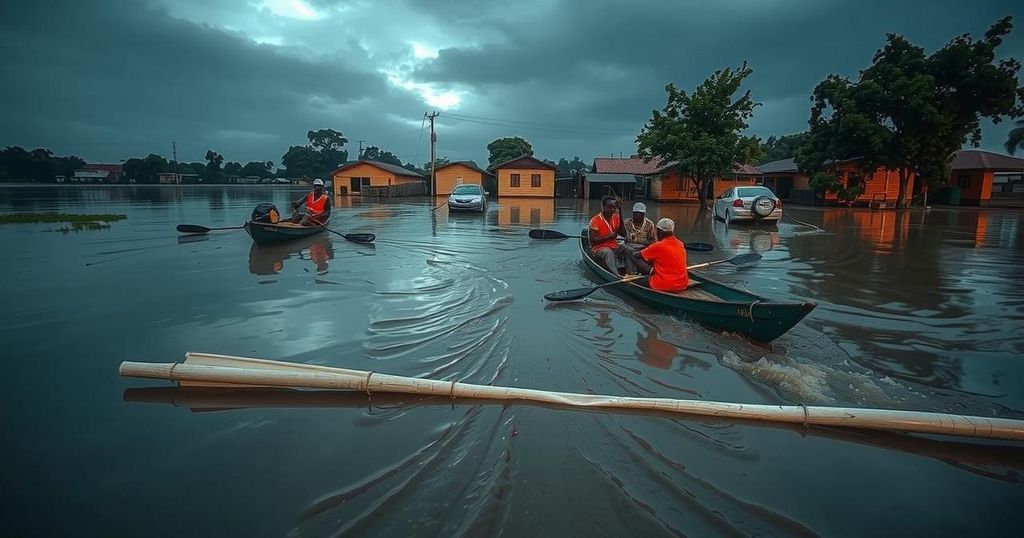Weather
ABYEI, AFRICA, ANI, CENTRAL EQUATORIA, DISASTER MANAGEMENT, FLOOD, FLOODS, HUMANITARIAN AID, INTER, INTERNALLY DISPLACED PERSONS (IDPS, INTERNATIONAL FEDERATION OF RED CROSS, JUBA COUNTY, MONSOON, OCHA, SUDAN, UN ICEF, UNITED NATIONS, UNITED NATIONS OFFICE FOR THE COORDINATION OF HUMANITARIAN AFFAIRS
Elena Martinez
0 Comments
Severe Flooding in South Sudan Displaces Thousands and Raises Health Risks
Flooding in South Sudan has affected 1.4 million people and displaced over 300,000, with Jonglei and Northern Bahr el Ghazal being the hardest hit. A significant surge in malaria cases has compounded the crisis, overwhelming health systems. The floods, ongoing since May 2024, are primarily due to heavy rainfall and climate change-related issues, threatening homes, livestock, and crops.
The recent floods in South Sudan have inflicted severe humanitarian consequences, affecting approximately 1.4 million individuals and displacing over 300,000, according to reports from the United Nations. The most significantly impacted regions include Jonglei and Northern Bahr el Ghazal, which account for more than half of the affected population. In addition to widespread displacement, health systems are encountering crises due to a spike in malaria cases in various states, further exacerbating the adverse effects of the flooding. As per the United Nations Office for the Coordination of Humanitarian Affairs (OCHA), assessments conducted by government and inter-agency teams have discovered increasingly alarming conditions, including an additional 1,720 individuals identified as displaced in Mangalla, Juba County. Additionally, communities in Jonglei, Unity, Upper Nile, Northern Bahr el Ghazal, Central Equatoria, and Western Equatoria have reported notable increases in malaria incidences, leading to overwhelmed healthcare facilities in these flood-stricken areas. The flooding, which commenced in May 2024 due to heavy rainfall and the overflowing Nile River, has wreaked havoc on residential structures, as well as agricultural resources and livestock. The ongoing flooding crisis has been progressively worsening over recent years, highlighting severe implications linked to climate change in South Sudan. UNICEF previously indicated in a 2021 report that flooding impacts between 750,000 and over one million people annually. This persistent adversity necessitates immediate humanitarian assistance and long-term strategies to mitigate the impacts of similar natural disasters in the future.
The humanitarian crisis in South Sudan has been aggravated by frequent flooding linked to heavy rainfall and climate change impacts on the region. The persistent nature of these floods has led to significant displacement, destruction of infrastructure, and increased health risks, particularly from diseases such as malaria. Understanding the scale and frequency of these environmental challenges is essential for developing effective humanitarian responses and addressing the long-term vulnerabilities faced by communities in South Sudan.
The flooding in South Sudan has resulted in severe humanitarian challenges, displacing thousands while leaving many more in dire need of assistance. The surge in malaria cases has further complicated recovery efforts, stressing already strained health systems. The situation underscores the urgency for coordinated humanitarian responses to address both immediate needs and long-term vulnerabilities exacerbated by climate change.
Original Source: www.aninews.in




Post Comment